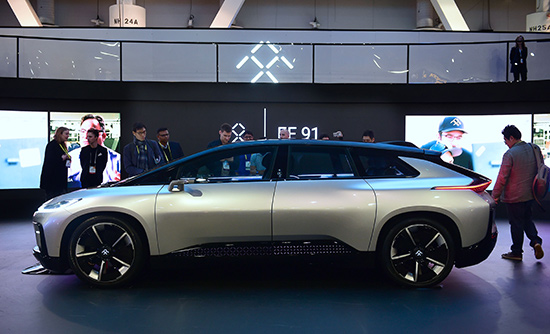贾跃亭申请破产了,但他的汽车公司还没有死

|
中国非议最多的企业家之一贾跃亭在特拉华州法庭申请按照《破产法》第11章破产重组,以便让其摆脱36亿美元的个人债务,并确保法拉第未来公司的继续运转。该公司是其在美国创建的一家电动汽车公司。 在申请文件中,贾跃亭通过向债权人信托转让其在法拉第未来的母公司Smart King Ltd的股权,为其债权人提供了获取其洛杉矶法拉第未来公司多数股权的机会。作为交换,贾跃亭的约100位债权人——其中90%位于中国——将同意免去贾跃亭所欠的价值36亿美元的债务。 然而,这一申请对于贾跃亭的债权人来说可能没有足够的吸引力,因为贾跃亭提醒其债权人,他们仅在公司上市之后才能获得其资金。随着投资者对中国电动汽车初创企业蔚来失去信心,去年亏损4.77亿美元的法拉第顺利开展IPO的可能性似乎并不高。 掌控全局 贾跃亭于2014年创建法拉第未来公司,但他与公司的关联直到2015年才得以公布,当时美联社在该公司致内华达立法人员的信中发现了贾跃亭的名字。那时,法拉第正在游说在沙漠之中建设汽车工厂事宜,并承诺投资10亿美元,创建4500个工作岗位。 这家电动汽车初创企业被吹捧为特斯拉的竞争对手。随后,这家由中国人持有的神秘公司开始从电动汽车竞争对手公司中挖人,宣布了大手笔的开支计划,并十分应景地发布了未来感十足的概念车(很快被人们比作“蝙蝠车”),它很快成为了媒体竞相追逐的对象。然而到目前为止,法拉第连自身所宣扬的愿景都还没有实现。 2017年,也就是项目破土一年后,法拉第抛弃了10亿美元的内华达工厂计划,然后卖掉了那块地。多名高管在公司遇到财务困境数月之前离开了公司。法拉第首发车型(比“蝙蝠车”这款概念车更接地气)的生产比原计划晚了一年多。 尽管一直以来举步维艰,但法拉第在2018年年初从中国地产商恒大集团那里拿到了8亿美元的投资,但其当年年底的账面亏损依然高达4.77亿美元。法拉第在今年1至7月进一步亏损了1.03亿美元,将其创建以来的总亏损额推升至21.5亿美元。 下沉式的职业生涯 贾跃亭曾在中国富豪榜上排名第17,其通往破产的蜿蜒之路始于2016年。当时,这位企业家将其成功的数字订阅服务乐视(又被称为中国的“Netflix”)重组成了一团错综复杂的业务部门。 在顶峰时期,乐视庞大的产品生态系统涵盖电视和智能手机制造、音乐和电视流媒体服务,还有电影制作和汽车生产。这一系列业务均属于一家名为乐视网的新母公司,其名称意为“幸福的生态系统。” 然而,由于急于打造一个企业帝国,贾跃亭开始让公司大举负债,结果这位自以为是、被称为中国乔布斯的企业家不得不于2017年屈驾担任乐视网旗下上市公司乐视的首席执行官。同一周,中国法院冻结了贾跃亭和乐视持有的1.75亿美元资产,然后将贾跃亭纳入失信人员黑名单。 很明显,贾跃亭已经移居美国,而且对于中国股市监管方当年要求其回国并偿还债务的命令熟视无睹。这位跑路的企业家选择待在加州,并开始接管法拉第,担任其首席执行官。 回归中国 法拉第公司网站的声明称,贾跃亭的破产重组计划将有助于“进一步推动法拉第美中双本土市场策略的实施”。如果该计划得到批准,贾跃亭将留在公司,担任创始人及“首席产品和用户官”。 值得注意的是,该计划将清除贾跃亭在中国的债务,并有望为这位失信人员回归中国担任法拉第发言人铺平道路。 四面楚歌的法拉第表示,公司仍将在明年9月发布其FF91车型,并希望其首款车型能够同时获得美国和中国市场的认可。 乐观的卡斯腾·布雷特菲尔德对中国媒体说,法拉第希望在中国设立生产厂,生产该品牌的第二款车型FF81。卡斯腾是宝马前高管,亦是电动汽车竞争对手公司拜腾的创始人,他于9月接替贾跃亭担任法拉第的首席执行官。 中国会欢迎贾跃亭回归吗?(财富中文网) 译者:冯丰 审校:夏林 |
One of China’s most beleaguered entrepreneurs, Jia Yueting, has filed for Chapter 11 bankruptcy with a court in Delaware in a bid to clear himself of a $3.6 billion debt and to keep the wheels on Faraday Future, the electric car venture he founded in the U.S. In the filing files, Jia offered his creditors the chance to take over his majority stake in the L.A.-based Faraday Future (FF) by transferring his equity in FF’s parent company, Smart King Ltd, to a creditor trust. In exchange, Jia’s 100 or so creditors—90% of which are in China—would agree to forgive the $3.6 billion worth of debt Jia owes. However, that offer might not be so tempting to Jia’s hungry creditors as Jia warns his creditors will only recover their money if the company goes public. With investors souring on fellow Chinese electric vehicle (EV) startup Nio, the chances of Faraday Future—which recorded $477 million in losses last year—hosting a healthy IPO seem low. In the driver’s seat Jia Yueting founded Faraday Future in 2014 but his involvement with the company was only revealed in 2015 when the Associated Press found his name on a company letter sent to Nevada lawmakers. At the time, Faraday Future was lobbying to build a car factory in the desert, pledging to invest $1 billion and create 4,500 jobs. The EV start-up, which was hyped as a rival to Tesla, quickly garnered media attention as the mysterious, Chinese-owned Faraday poached key players from rival EV firms, announced lavish spending plans and released a suitably futuristic concept car, which was soon likened to the Batmobile. The company has so far, however, failed to live up to its own hype. In 2017 Faraday abandoned plans for a $1 billion Nevada factory, a year after breaking ground on the project, and has since sold the plot of land; a slew of top executives had abandoned the company months earlier as the company struggled with financing; and production of the company’s debut model—much more down to earth than the Batmobile concept car—is over a year behind schedule. Despite its struggles, FF managed to attract an $800 million investment from Chinese real estate developer Evergrande at the start of 2018 but still ended the year with a loss of $477 million on its books. Faraday lost a further $103 million through to the end of July this year, bringing its total losses since inception to $2.15 billion. A careening career Once the 17th richest man in China, Jia’s winding road to bankruptcy arguably began in 2016 when the entrepreneur restructured his successful digital subscription service LeTV—dubbed “China’s Netflix”—into a tangled mess of business lines. At its peak, LeTV’s sprawling ecosystem of products comprised TV and smartphone manufacturing, music and TV streaming, plus film production and auto making. The myriad business interests sat under a new parent company called LeEco, or “Happy Ecosystem.” However, in his haste to develop a corporate empire, Jia plunged the company into debt, forcing the brash entrepreneur—once lauded as China’s Steve Jobs—to step down as CEO of LeEco’s listed unit, LeShi, in 2017. That same week, a Chinese court froze $175 million in assets held by Jia and LeShi and later placed Jia on a blacklist of debtors. Jia, who had apparently already moved to the U.S., defied an order from China’s stock market regulator to return to China that year and pay off his debts. The runaway entrepreneur chose instead to stay in California and take over as CEO of Faraday Future. Back to China According to a statement on FF’s website, Jia’s restructuring scheme will help “further advance the implementation of FF’s US-China dual home market strategy.” If the plan is approved, Jia will stay on with the car company as founder and “Chief Product & User Officer”. Significantly, the plan will clear Jia’s debts in China, potentially paving a way for the blacklisted debtor to return to the country as a spokesperson for the car company. The embattled Faraday Future says it is still targeting the release of its FF91 model by September next year with hopes the brand’s inaugural car can take on both the U.S. and China markets. An optimistic Carsten Breitfeld—the former BMW executive and co-founder of rival EV firm Byton who replaced Jia as CEO of Faraday in September—told Chinese media the group hopes to set up a production facility in China to produce the brand’s second model, the FF81. Will China welcome Jia back? |













